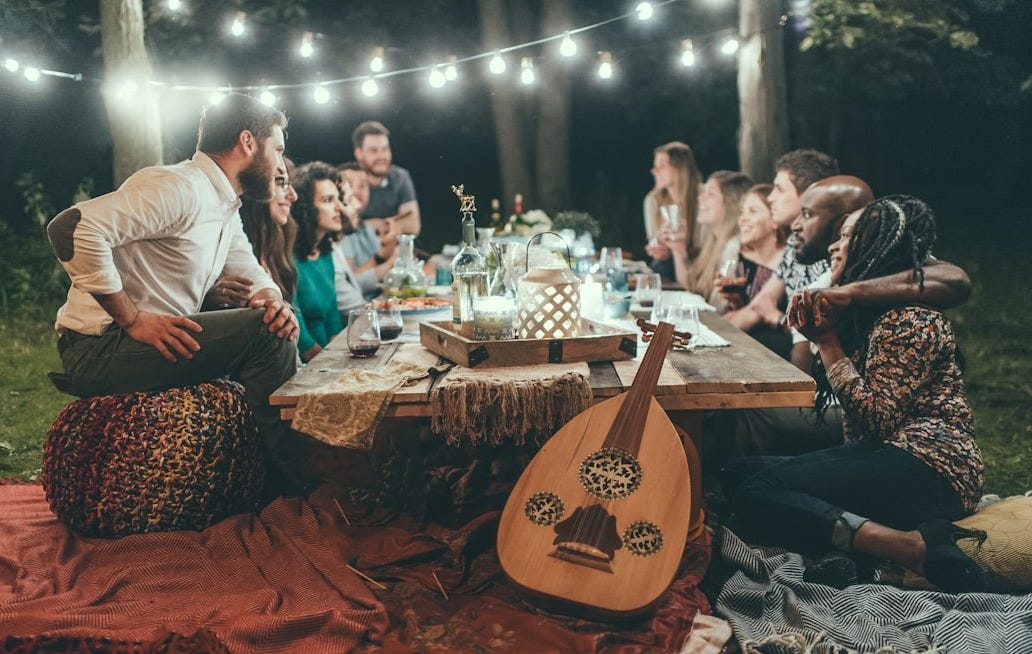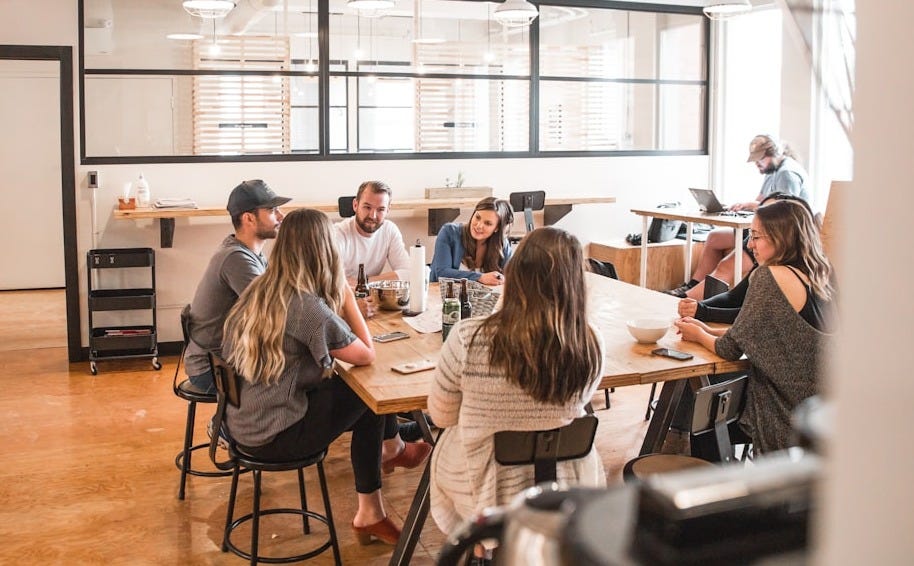What is a Tribe? In the context I’m referring to, a tribe is a collection of 20 -150 individuals that live in a community sharing resources and a common purpose. The focus is not on the individual but on the group as a whole. Everyone in a tribe contributes to its well being which allows them to feel connected to something greater than themselves. Humans are social creatures, and for most of our existence on earth, we have lived in tribes or clans of some sort, but in our modern world we are so disconnected from where our resources come from and the supply chain that brought them to us that we have no appreciation or emotional connection to their source. Nowadays, it feels like our survival is directly linked not to those we love, but to how much money we make. It is no wonder mental illness runs rampant in our society. Money is an artificial construct that has no inherent value, but we place so much value on it because our well-being depends on it. Is that evolution or devolution in the human species? Where is the human connection that gives us so much satisfaction? Living in a tribe with friends and kinsman that we love, who are directly responsible for our survival, is what humans were built for.

I think we can all relate to wanting to make more money. I certainly do. But interestingly, as affluence goes up, so does individualization and isolation. The saying, “it’s lonely at the top,” rings true, particularly in America. We live in bigger houses and rarely know our neighbors. Even if we live in urban areas surrounded by millions of people, humans lose the ability to connect emotionally once the group expands past 150 individuals1. America is one of the wealthiest and most individualized nations in the world, but anxiety and depression are two of the most common mental health conditions experienced by adults2. People on the lower end of the economic spectrum are usually surrounded by more friends, family, and community because their survival depends on it. If they need childcare or a house repair, they often can’t afford to pay a stranger to do it for them, so they recruit friends or family to help out. While having less money is not necessarily fun or easy, it may be less lonely and provide more richness through community. Working collectively and collaborating with others has the potential to create a buffer from our own psychological troubles, which has the potential to increase overall happiness while reducing anxiety and depression3.
In our modern society, the office environment, internet groups, or classrooms often resemble tribes and evoke feelings of belonging, but they are not tribes; they are more like bandaids on a longing for belonging. While co-workers and classmates may share a common purpose, they lack kinship and the members do not cooperate to sustain one another. The internet and social media often give the false impression of friends, but it does not provide us with the resonance of the mirror neurons like that of in-person human connections that we all need. While we all may crave a tribe and community, the juxtaposition is that the current structure of our modern society isn’t designed to be supportive of community.

In modern society, jobs are often monotonous and provide a paycheck to buy the resources we need to live. We are disconnected from their source. It is very satisfying to be able to provide for ourselves directly by growing food in a garden because it gives us a sense of competency and connection with nature. When our ancestors were living in tribes, they often faced dangers that spurred a profound sense of “what happens to you, also happens to me,” whether it be hunger or being attacked by a tiger; if you survive, I survive. Some members of a tribe may not have even liked each other, but they were willing to die for one another. For many soldiers returning from war, it is the sudden isolation and separation from their tribe that exacerbates PTSD, in addition to the trauma from the war itself4 . Humans are an incredibly resilient species; we were built to survive and recover from trauma. A platoon in the army is essentially a tribe; they are a close knit group of soldiers who live together, eat and sleep together, and risk their lives for each other. This is often why soldiers experience shock once returning home and experience a desire to go back to war; they miss the adventure, connection, and purpose that living in a tribe provides.
People often seek out difficult and challenging situations (like hiking for days on end in the rain) because it helps them rediscover their sense of competency in the natural world. One of the most satisfying and confidence building experiences in my life was thru-hiking the Appalachian Trail from Georgia to Maine. It took five months, and the camaraderie I found on the trail is unlike anything I’ve found in our modern, convenient world. It is difficult to describe the strong bond that forms between thru-hikers. People I had only known for a day suddenly felt like family. Maybe it was because we shared the common purpose of hiking for multiple months to Maine with the sole possessions on our back, or maybe it was because we were all in the middle of the wilderness and knew if we got into any danger, our lives may depend on our fellow hikers. We had all released our identities and egos from society and were humbled by the Trail which molded us into the best, truest versions of ourselves. In many ways, it felt like coming home to humanhood. As humans, we were made to be mobile and live in groups.
Thru-hikers synch into a rhythm with each other and the natural world. Walking on the earth and through the forest plugged us into the earth’s heartbeat and flow of nature. I knew the moon cycles, and I learned to read the landscape for the direction and cloud patterns for incoming weather. The birds became my alarm clock, and to this day, 20 years later, I still awaken with the sunrise. When people ask me what was the hardest part of the Trail, they are often surprised (or disappointed) by my answer: coming “home,” which meant integrating back into modern society. The pace and pressure I felt after returning from my thru-hike caused me to have several panic attacks before I could reacclimatize. Life suddenly felt so backwards and superficial, like we were doing it all wrong. People expected me to feel grateful to be home and back to all the modern conveniences. Now, don’t get me wrong, a refrigerator, washing machine, and hot water heater are all wonderful inventions that I was appreciative to return to, but on a happiness and soul-fulfillment level, I was much fuller on the Trail. Granted, I was not gathering my food along the way, but I was rediscovering a sense of efficacy in the natural world and reconnecting to my tribe.

As a parent, I can say that the nuclear family model, which has been the standard for the past 75 years, is failing our children and future generations. It doesn’t give them a large enough tribe to identify with. A community satisfies children’s sense of recognition and belonging to a place in the world. It provides roots and helps them to feel a part of something greater than themselves, giving them a sense of purpose. The need to belong and fit in is our deepest, most primal instinct; we are hard-wired for it as the ultimate source of security. Children may not have the wherewithal to recognize that something is missing, but they sense the void which often gets filled with distracting devices. The part of them that longs for community, a fundamental part of humanity, goes unfulfilled. Approximately 20% of children in our society are receiving mental health treatment for some form of anxiety disorder5, likely because they feel their lives lack purpose. They are not sharing or contributing to a community. Yes, children can do chores to contribute to the household, but it lacks the same gravitas as gathering food for your tribe-mates. Now, don’t get me wrong, I’m not saying we should go back to being hunter-gatherers, I’m merely claiming that the data, and my personal experience as a parent, says that our current system is not serving our children.
When I look closely, I can see that the nuclear family model is starting to unravel at the seams. As the middle class evaporates, the cost of living as a nuclear family, and the amount of work it takes to uphold that model, is becoming unattainable for many. My homeowners insurance alone has risen 50% in the past four years for no apparent reason, not to mention the cost of utilities and food. It often feels as if we are one tragedy (be it natural or financial) away from being forced to live in community because our survival depends on it. Albeit difficult and challenging at first, we may find it to be more satisfying on the other side, after the initial adjustment period. It may provide us with the opportunity to relearn how to live in community and reconnect to our humanness. Tribes allow for altruism, generosity, and reciprocity in more ways than our current way of living does. If our individualized, transactional society comes undone, may we remember how human beings used to live, and what allows us to feel truly alive. Hopefully we can see a paradigm shift as an opportunity to reshape our social structure into one that satisfies and supports our souls.
The Southern Guidestones is an entirely reader-supported educational endeavor, your generosity empowers us to continue sharing quality content with you. If you feel called, there’s a couple of ways you can contribute:
Tribe: On Homecoming and Belonging, by Sebastian Junger
ttps://www.cdc.gov/nchs/data/nhsr/nhsr213.pdf
Tribe: On Homecoming and Belonging, by Sebastian Junger
Tribe: On Homecoming and Belonging, by Sebastian Junger
https://www.cdc.gov/children-mental-health/data-research/index.html




“Coming home to human hood”!
Beautifully written article with so many precious nuggets of wisdom.